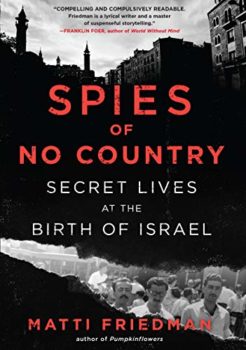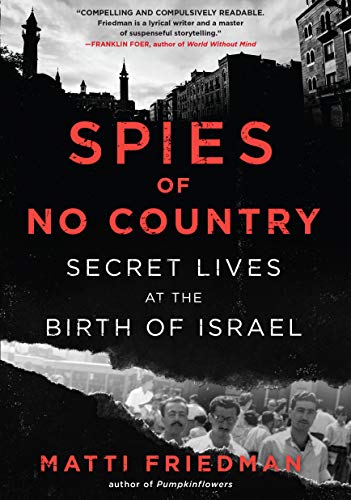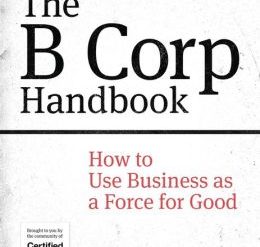
When Americans think of Israeli history, we fasten on a handful of names: Chaim Weizmann. David ben Gurion. Golda Meir. We think of kibbutzim, the Israeli Defense Force, the country’s great universities, and its legal system. All these people, and many others whose names are prominent in the country’s history, are of European origin. And every institution they created was a product of European thought and tradition. That simply reflects the fact that “in the 1940s, nine of every ten Jews in Palestine came from Europe.”
Estimated reading time: 5 minutes
Yet the persistent image of Israel today as a Western outpost in the Eastern Mediterranean is highly misleading. To understand how that changed and so deeply influences the nation’s politics today, you can do no better than to read Israeli-Canadian journalist Matti Friedman‘s revealing new book, Spies of No Country.
Spies of No Country: Secret Lives at the Birth of Israel by Matti Friedman (2019) 273 pages ★★★★☆
Four young Arab-speaking Jewish men were the first Israeli spies
Friedman’s book tells the tale of four young Arab-speaking Jewish men who became spies for the scattered forces working to establish the State of Israel. They had emigrated to join Jewish settlements in Palestine from their homes in Damascus, Aleppo, Arab-occupied Jerusalem, and Yemen. They were, in a word, Asian Jews, like millions of others who later fled the towns and cities of the Middle East and North Africa following Israel’s declaration of independence in 1948.
Though Friedman doesn’t venture into Israeli political history, it’s clear that long-neglected population rose into prominence in 1977 with the election of Menachem Begin. The country’s rightward shift ever since then is one result. As Friedman points out, Asian Jews account today for half the country’s population, and they tend to be poorer and less well educated than those of European descent. Prime Minister Benjamin Netanyahu‘s long term in office is only the most recent manifestation of the sea change they embody in the country’s political orientation.
“There was no state called Israel, nor did it seem likely there would be one.”
The four men who constitute Friedman’s principal subject were among some ten Arab-speaking Jews recruited by the Palmach in the years leading up to the War of Independence. They were formed into an Arab Section that has received scant attention from historians. The men were sent, singly or in teams, to Beirut and other Arab capitals to gather intelligence, armed with their wits and only the most minimal training. “There was no state called Israel, nor did it seem likely there would be one. The United Nations had no way to enforce the partition plan” mandated by the General Assembly in November 1947. And war had immediately broken out following its passage.
They were “the embryo” of the Mossad
It’s difficult to imagine how poorly trained and ill-equipped were the men of the Arab Section. As Friedman wrote, “there weren’t any cars. At the time, the Arab Section didn’t even own a radio. When they needed a camera for one surveillance mission . . . they’d had to borrow a Minox from a civilian they knew.” And at first there was no money, either. “It wasn’t just that the Palmach couldn’t pay salaries. The unit couldn’t always cover bus fare or a cheap plate of hummus for lunch, and on at least one occasion agents had to stop trailing a target because they didn’t have money for a night in a hostel.”
The men lived by their wits, acting on instinct that frequently led them to make mistakes. Yet they survived (unlike most of their fellows in the Arab Section), and they succeeded in feeding useful intelligence to their handlers in Palestine. “[A]fter hostilities began in 1948, the Section proved to be one of the only effective intelligence tools the Jews had.”
However, there is no earth-shattering revelation in Spies of No Country. The four agents’s “mission didn’t culminate in a dramatic explosion that averted disaster, or in the solution of a devious puzzle. Their importance to history lies instead in what they turned out to be—the embryo of one of the world’s most formidable intelligence services.” And one of the four men Friedman writes about became one of Mossad’s most celebrated agents.
For related reading
Recently I reviewed a book about espionage in an earlier era of Israeli history, decades before the state came into being: Spies in Palestine: Love, Betrayal, and the Heroic Life of Sarah Aaronsohn by James Srodes. My review is at The female Jewish spy who helped pave the way to the State of Israel. And for an excellent novel about the Mossad in later decades, see Duet in Beirut by Mishka Ben-David (A failed Mossad operation threatens catastrophe).
You might also be interested in:
- The Angel: The Egyptian Spy Who Saved Israel by Uri Bar-Joseph (An extraordinary episode in Israeli history);
- My Promised Land: The Triumph and Tragedy of Israel by Ari Shavit (A prominent Israeli columnist’s sober assessment: Will Israel survive?);
- The Debba by Avner Mandelman (A superb novel digs for roots in Israel’s modern history);
- City of Secrets by Stewart O’Nan (Inside the fight for Israeli independence); and
- Murder Under the Bridge: A Palestine Mystery by Kate Jessica Raphael (In a Palestinian mystery, a young female cop confronts Israeli corruption).
You might also check out 30 worthy books about Jewish topics and 20 top nonfiction books about history.
And you can always find my most popular reviews, and the most recent ones, on the Home Page.



























